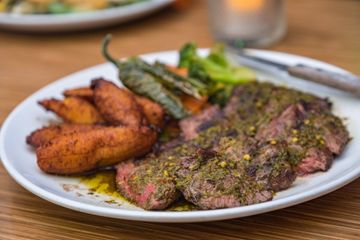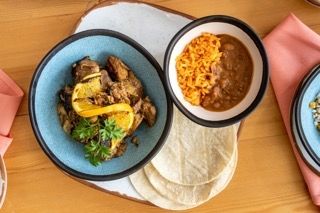Is Mexican Food Healthy? Unloading the Nutritional Conveniences of Typical Active Ingredients
The inquiry of whether Mexican food is healthy invites an exploration of its typical components. Beans and corn function as fundamental staples, rich in protein and fiber. Avocados supply beneficial fats, while numerous herbs and spices add taste and wellness benefits - tacos. Together, these parts develop a tapestry of nutrition. Nonetheless, the healthiness of Mexican food usually depends upon prep work techniques and section sizes. What duty do these elements play in identifying its general dietary value?
The Power of Beans: Protein and Fiber-Rich Staples
Although frequently neglected, beans work as a foundation of Mexican cuisine, offering a riches of dietary benefits. Rich in healthy protein, they are an exceptional plant-based option for those looking for to fulfill their nutritional healthy protein requires. This high healthy protein content sustains muscular tissue repair and growth, making beans vital for both meat-eaters and vegetarians alike. Additionally, beans are an outstanding source of nutritional fiber, which helps in digestion and advertises a sensation of volume, potentially aiding with weight administration.
The selection of beans utilized in Mexican meals, such as black beans, pinto beans, and kidney beans, adds to a varied taste account and can boost meals nutritionally. Beans are low in fat and contain crucial vitamins and minerals, including magnesium, folate, and iron. Together, these characteristics make beans a crucial active ingredient, delivering both nutrition and sustenance in typical Mexican fare.

Corn: a Versatile Grain With Nutritional Perks
Corn sticks out as a versatile grain basic to Mexican cuisine, commemorated not just for its cooking applications yet additionally for its remarkable nutritional profile. As a primary component in recipes like tortillas, tamales, and pozole, corn provides crucial nutrients that add to a well balanced diet. Rich in carbs, it acts as a substantial energy resource, while also being reduced in fat, making it a beneficial alternative for numerous dietary demands.
Additionally, corn is a great resource of dietary fiber, which helps in food digestion and promotes satiety. It has significant quantities of vitamins such as B-complex vitamins, which are crucial for power metabolism. The visibility of antioxidants, particularly carotenoids, contributes to total health and wellness by lowering oxidative tension. Furthermore, corn is gluten-free, accommodating those with gluten sensitivities. Overall, the dietary benefits of corn emphasize its relevance in standard Mexican food and its function in a healthy and balanced diet regimen.
Avocados: Healthy Fats and Nutrients in Every Bite
Avocados play a considerable function in Mexican food, enhancing meals with their luscious appearance and abundant flavor. Beyond their culinary charm, avocados are celebrated for their impressive dietary account. They are an abundant source of healthy and balanced monounsaturated fats, which can aid reduced bad cholesterol degrees and assistance heart health. Additionally, avocados are packed with important vitamins and minerals, including potassium, vitamin E, and B vitamins, adding to total wellness.
The high fiber content in avocados aids food digestion and promotes satiety, making them a valuable addition to any kind of meal. Their unique nutrient make-up can additionally sustain skin health and supply anti-inflammatory advantages. Incorporating avocados into standard Mexican recipes or enjoying them as a standalone snack can improve both flavor and nourishment, demonstrating why they are a cherished staple in cracker barrel front porch Mexican cuisine. On the whole, avocados supply a delicious method to delight in healthy fats and crucial nutrients in every bite.

Herbs and seasonings: Flavorful Wellness Boosters
While enjoying the rich tastes of Mexican food, one can not forget the crucial role that spices and natural herbs play in improving both taste and health. Components such as cilantro, oregano, and chili peppers not just add to the vibrant taste account however also supply significant health and wellness benefits. For instance, cilantro is recognized for its detoxing residential or commercial properties, aiding to remove hefty metals informative post from the body, while oregano is loaded with anti-oxidants and has anti-inflammatory results.
Chili peppers, a staple in lots of Mexican recipes, include capsaicin, which has been connected to improved metabolic process and pain relief. Furthermore, seasonings like cumin and coriander support food digestion and might help in blood glucose law. Integrating these delicious health and wellness boosters into meals not just improves the culinary experience but additionally advertises overall well-being, making Mexican cuisine not just scrumptious, however likewise nutritionally beneficial.
Traditional Food Preparation Techniques: Enhancing Nutrition and Taste
Standard food preparation techniques in Mexican cuisine play an essential function in improving both nourishment and flavor, as they often focus on fresh ingredients and classic techniques. Strategies such as nixtamalization, where corn is soaked and cooked in an alkaline remedy, not only enhance the nutrient account of tortillas yet additionally enhance their digestibility - mexican food. In addition, the use of slow cooking approaches, like stewing or braising, permits tastes to meld wonderfully while preserving the honesty of the components

Regularly Asked Inquiries
Are Mexican Food Portions Typically Larger Than Various Other Cuisines?
Mexican food parts are often bigger than those of many various other cuisines. This particular mirrors traditional dining practices, emphasizing public sharing and hearty meals, which can cause a much more considerable serving dimension on the whole.
Just how Does the Preparation Technique Affect Healthiness of Mexican Food?
Prep work techniques greatly affect the healthiness of Mexican food. Methods such as cooking or steaming protect nutrients, while frying can enhance harmful fat web content. Selections of active ingredients and cooking designs inevitably establish total nutritional worth.
Can Mexican Food Be Tailored for Details Dietary Restrictions?
Mexican food can undoubtedly be customized for particular nutritional restrictions. Substitutions, such as making cheesecake factory near me use of corn tortillas for gluten-free diet regimens or integrating more veggies, make it possible for individuals to delight in typical flavors while suiting different dietary demands.
What Prevail Misconceptions About Mexican Food and Health?
Common misunderstandings concerning Mexican food consist of the idea that it is inherently unhealthy, overly zesty, and entirely concentrated on fats. In reality, traditional recipes commonly feature healthy active ingredients and can be tailored to numerous nutritional requirements.
Exist Healthier Choices at Mexican Dining Establishments?
Much healthier options at Mexican restaurants frequently consist of barbequed meats, beans, and fresh vegetables. Picking recipes that stress entire ingredients and avoiding hefty sauces can cause a much more nutritious dining experience, promoting total wellness.
The range of beans utilized in Mexican meals, such as black beans, pinto beans, and kidney beans, contributes to a varied taste profile and can boost dishes nutritionally. Avocados play a substantial function in Mexican cuisine, matching dishes with their velvety structure and rich taste. Integrating avocados right into conventional Mexican recipes or enjoying them as a standalone treat can enhance both flavor and nutrition, demonstrating why they are a beloved staple in Mexican cuisine. While delighting in the rich flavors of Mexican cuisine, one can not ignore the important duty that spices and natural herbs play in enhancing both taste and health. Standard food preparation methods in Mexican cuisine play an essential role in improving both nourishment and taste, as they frequently focus on time-honored techniques and fresh components.